Shared Value in Corporate Responsibility
VerifiedAdded on 2022/08/13
|10
|2282
|23
AI Summary
Contribute Materials
Your contribution can guide someone’s learning journey. Share your
documents today.
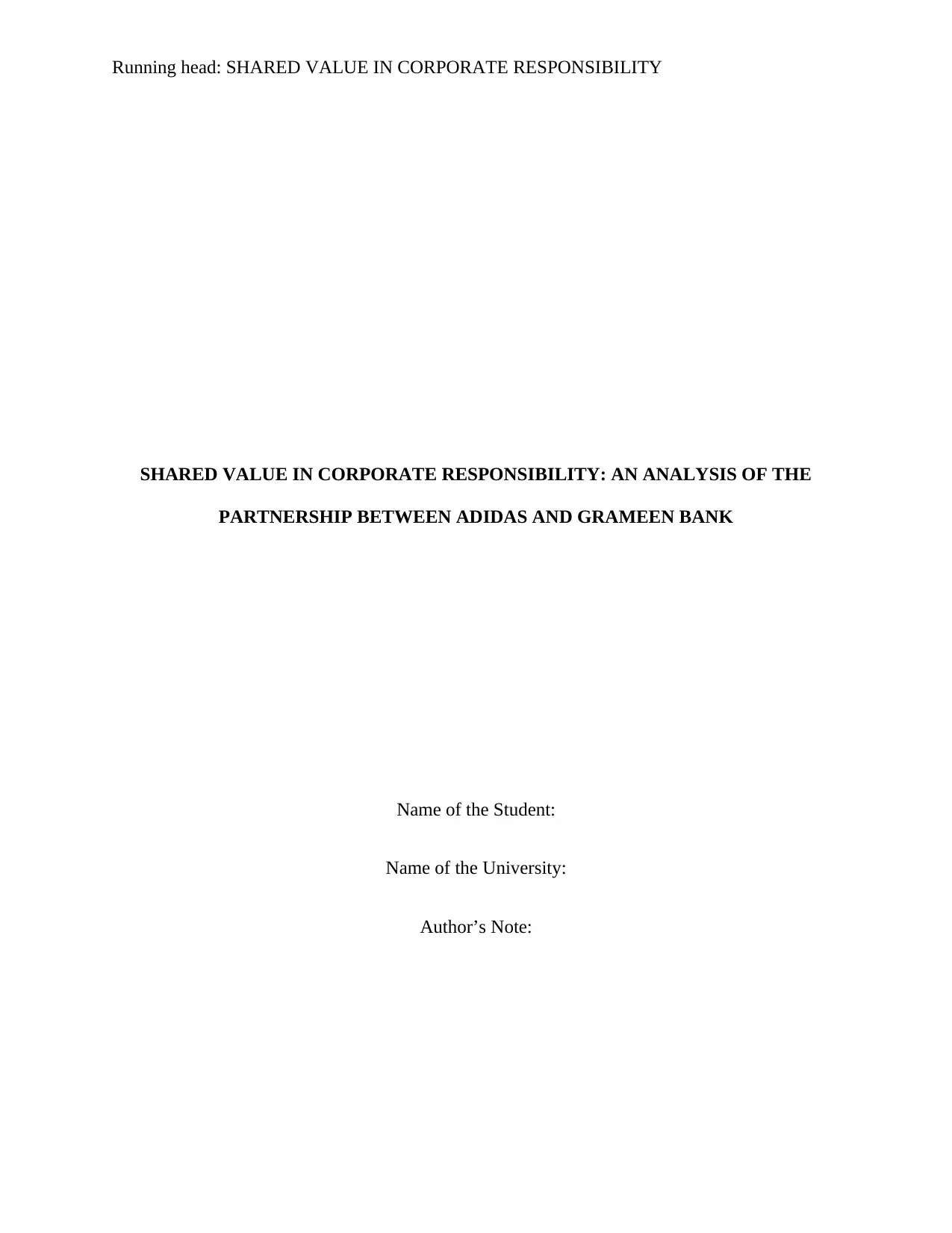
Running head: SHARED VALUE IN CORPORATE RESPONSIBILITY
SHARED VALUE IN CORPORATE RESPONSIBILITY: AN ANALYSIS OF THE
PARTNERSHIP BETWEEN ADIDAS AND GRAMEEN BANK
Name of the Student:
Name of the University:
Author’s Note:
SHARED VALUE IN CORPORATE RESPONSIBILITY: AN ANALYSIS OF THE
PARTNERSHIP BETWEEN ADIDAS AND GRAMEEN BANK
Name of the Student:
Name of the University:
Author’s Note:
Secure Best Marks with AI Grader
Need help grading? Try our AI Grader for instant feedback on your assignments.
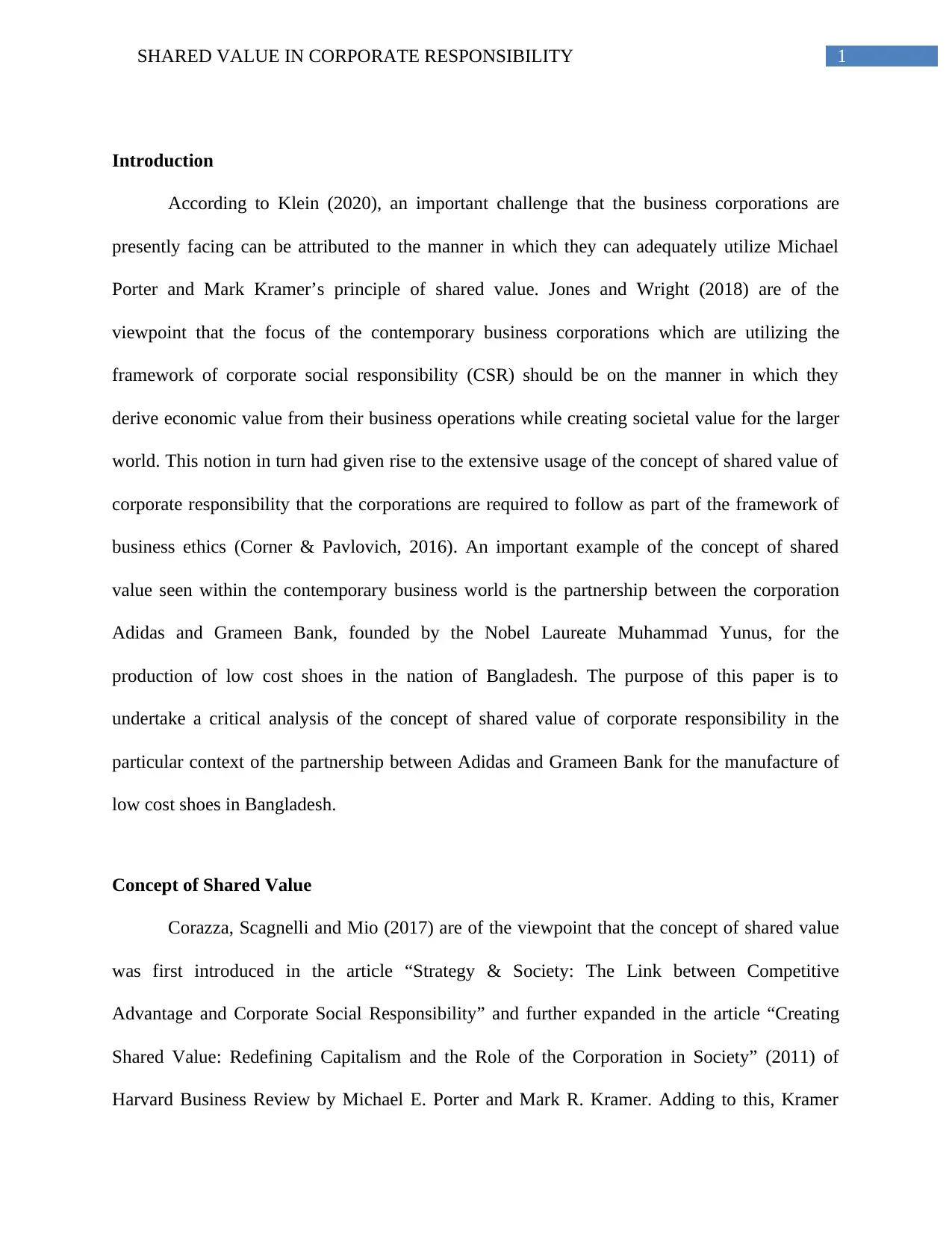
1SHARED VALUE IN CORPORATE RESPONSIBILITY
Introduction
According to Klein (2020), an important challenge that the business corporations are
presently facing can be attributed to the manner in which they can adequately utilize Michael
Porter and Mark Kramer’s principle of shared value. Jones and Wright (2018) are of the
viewpoint that the focus of the contemporary business corporations which are utilizing the
framework of corporate social responsibility (CSR) should be on the manner in which they
derive economic value from their business operations while creating societal value for the larger
world. This notion in turn had given rise to the extensive usage of the concept of shared value of
corporate responsibility that the corporations are required to follow as part of the framework of
business ethics (Corner & Pavlovich, 2016). An important example of the concept of shared
value seen within the contemporary business world is the partnership between the corporation
Adidas and Grameen Bank, founded by the Nobel Laureate Muhammad Yunus, for the
production of low cost shoes in the nation of Bangladesh. The purpose of this paper is to
undertake a critical analysis of the concept of shared value of corporate responsibility in the
particular context of the partnership between Adidas and Grameen Bank for the manufacture of
low cost shoes in Bangladesh.
Concept of Shared Value
Corazza, Scagnelli and Mio (2017) are of the viewpoint that the concept of shared value
was first introduced in the article “Strategy & Society: The Link between Competitive
Advantage and Corporate Social Responsibility” and further expanded in the article “Creating
Shared Value: Redefining Capitalism and the Role of the Corporation in Society” (2011) of
Harvard Business Review by Michael E. Porter and Mark R. Kramer. Adding to this, Kramer
Introduction
According to Klein (2020), an important challenge that the business corporations are
presently facing can be attributed to the manner in which they can adequately utilize Michael
Porter and Mark Kramer’s principle of shared value. Jones and Wright (2018) are of the
viewpoint that the focus of the contemporary business corporations which are utilizing the
framework of corporate social responsibility (CSR) should be on the manner in which they
derive economic value from their business operations while creating societal value for the larger
world. This notion in turn had given rise to the extensive usage of the concept of shared value of
corporate responsibility that the corporations are required to follow as part of the framework of
business ethics (Corner & Pavlovich, 2016). An important example of the concept of shared
value seen within the contemporary business world is the partnership between the corporation
Adidas and Grameen Bank, founded by the Nobel Laureate Muhammad Yunus, for the
production of low cost shoes in the nation of Bangladesh. The purpose of this paper is to
undertake a critical analysis of the concept of shared value of corporate responsibility in the
particular context of the partnership between Adidas and Grameen Bank for the manufacture of
low cost shoes in Bangladesh.
Concept of Shared Value
Corazza, Scagnelli and Mio (2017) are of the viewpoint that the concept of shared value
was first introduced in the article “Strategy & Society: The Link between Competitive
Advantage and Corporate Social Responsibility” and further expanded in the article “Creating
Shared Value: Redefining Capitalism and the Role of the Corporation in Society” (2011) of
Harvard Business Review by Michael E. Porter and Mark R. Kramer. Adding to this, Kramer
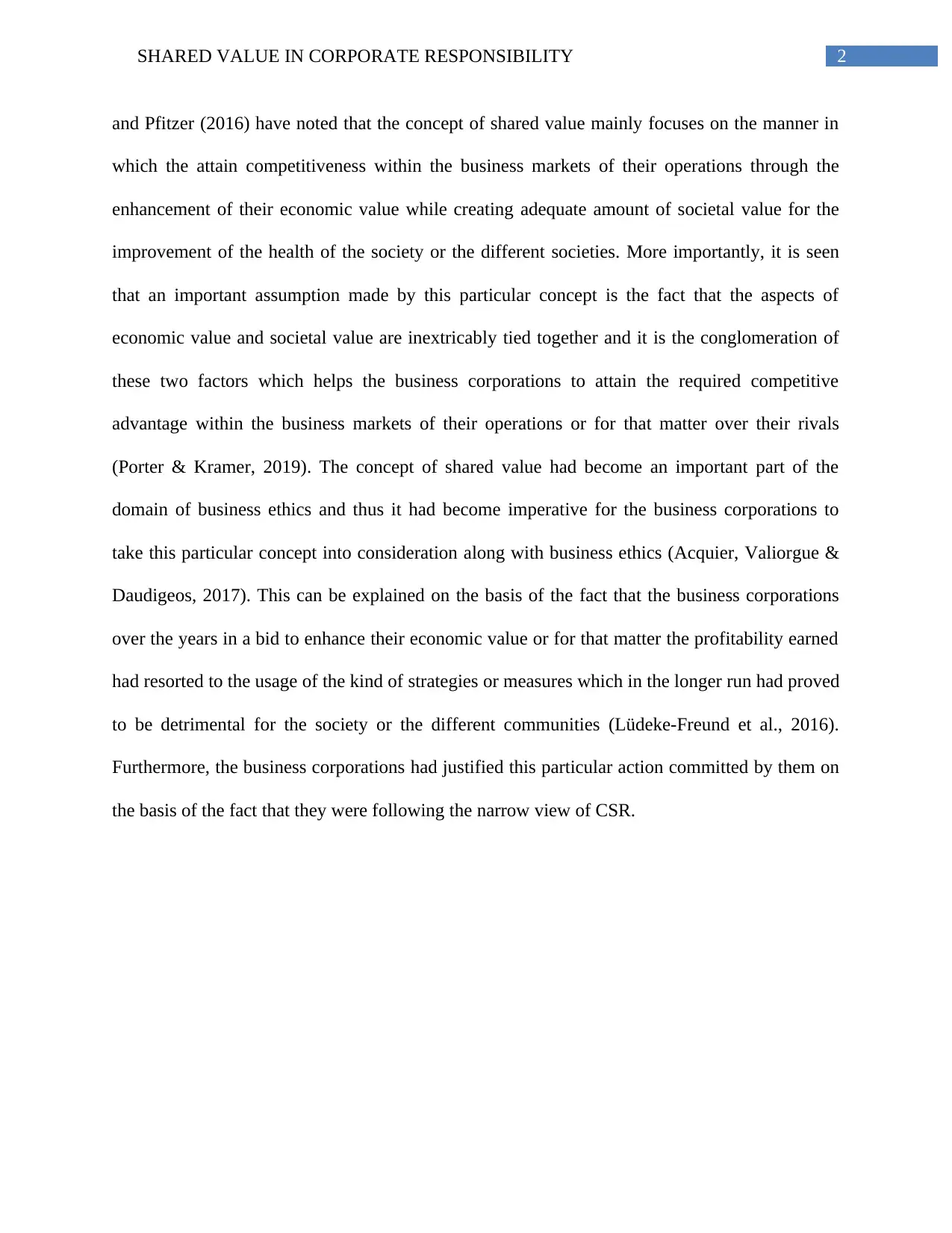
2SHARED VALUE IN CORPORATE RESPONSIBILITY
and Pfitzer (2016) have noted that the concept of shared value mainly focuses on the manner in
which the attain competitiveness within the business markets of their operations through the
enhancement of their economic value while creating adequate amount of societal value for the
improvement of the health of the society or the different societies. More importantly, it is seen
that an important assumption made by this particular concept is the fact that the aspects of
economic value and societal value are inextricably tied together and it is the conglomeration of
these two factors which helps the business corporations to attain the required competitive
advantage within the business markets of their operations or for that matter over their rivals
(Porter & Kramer, 2019). The concept of shared value had become an important part of the
domain of business ethics and thus it had become imperative for the business corporations to
take this particular concept into consideration along with business ethics (Acquier, Valiorgue &
Daudigeos, 2017). This can be explained on the basis of the fact that the business corporations
over the years in a bid to enhance their economic value or for that matter the profitability earned
had resorted to the usage of the kind of strategies or measures which in the longer run had proved
to be detrimental for the society or the different communities (Lüdeke-Freund et al., 2016).
Furthermore, the business corporations had justified this particular action committed by them on
the basis of the fact that they were following the narrow view of CSR.
and Pfitzer (2016) have noted that the concept of shared value mainly focuses on the manner in
which the attain competitiveness within the business markets of their operations through the
enhancement of their economic value while creating adequate amount of societal value for the
improvement of the health of the society or the different societies. More importantly, it is seen
that an important assumption made by this particular concept is the fact that the aspects of
economic value and societal value are inextricably tied together and it is the conglomeration of
these two factors which helps the business corporations to attain the required competitive
advantage within the business markets of their operations or for that matter over their rivals
(Porter & Kramer, 2019). The concept of shared value had become an important part of the
domain of business ethics and thus it had become imperative for the business corporations to
take this particular concept into consideration along with business ethics (Acquier, Valiorgue &
Daudigeos, 2017). This can be explained on the basis of the fact that the business corporations
over the years in a bid to enhance their economic value or for that matter the profitability earned
had resorted to the usage of the kind of strategies or measures which in the longer run had proved
to be detrimental for the society or the different communities (Lüdeke-Freund et al., 2016).
Furthermore, the business corporations had justified this particular action committed by them on
the basis of the fact that they were following the narrow view of CSR.
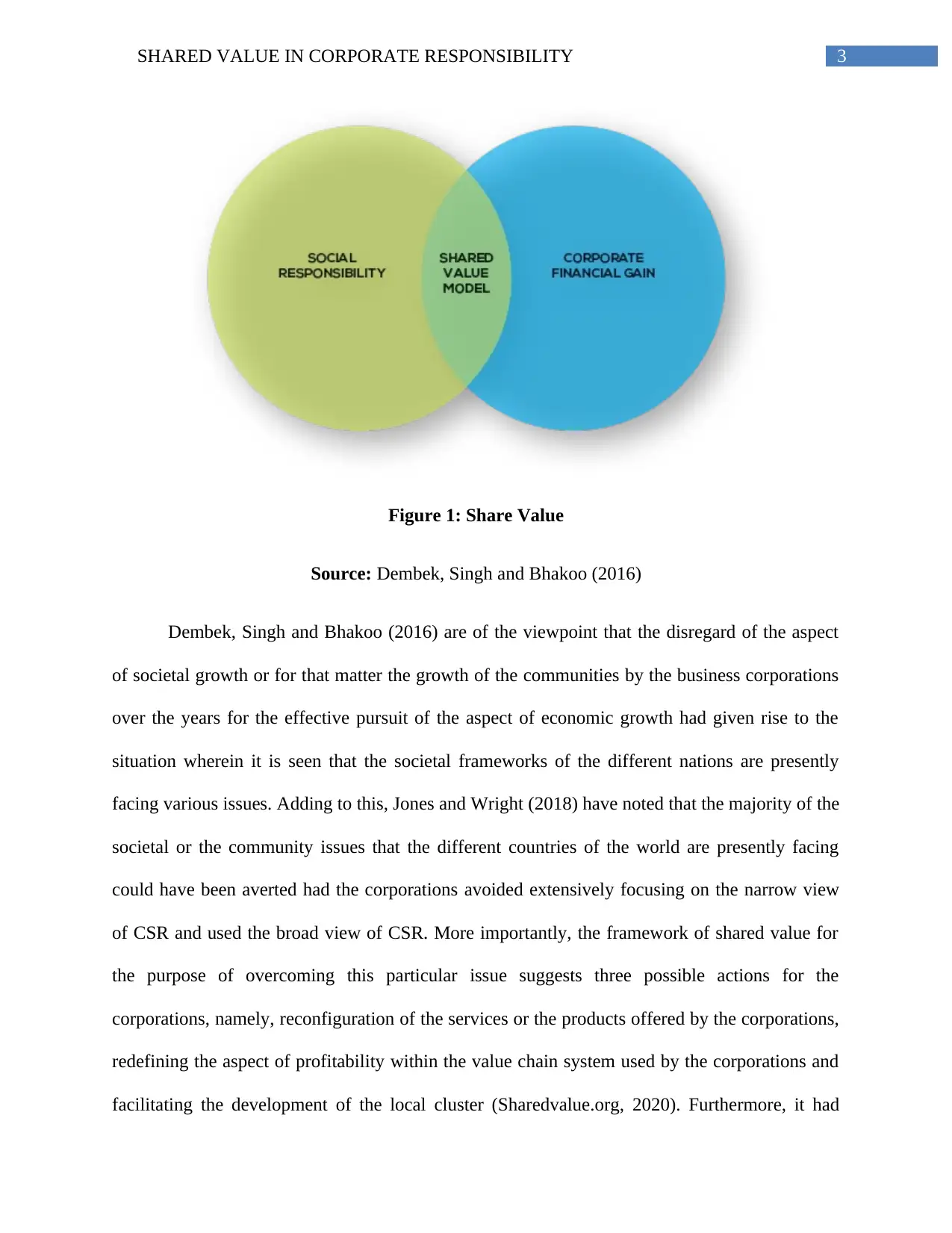
3SHARED VALUE IN CORPORATE RESPONSIBILITY
Figure 1: Share Value
Source: Dembek, Singh and Bhakoo (2016)
Dembek, Singh and Bhakoo (2016) are of the viewpoint that the disregard of the aspect
of societal growth or for that matter the growth of the communities by the business corporations
over the years for the effective pursuit of the aspect of economic growth had given rise to the
situation wherein it is seen that the societal frameworks of the different nations are presently
facing various issues. Adding to this, Jones and Wright (2018) have noted that the majority of the
societal or the community issues that the different countries of the world are presently facing
could have been averted had the corporations avoided extensively focusing on the narrow view
of CSR and used the broad view of CSR. More importantly, the framework of shared value for
the purpose of overcoming this particular issue suggests three possible actions for the
corporations, namely, reconfiguration of the services or the products offered by the corporations,
redefining the aspect of profitability within the value chain system used by the corporations and
facilitating the development of the local cluster (Sharedvalue.org, 2020). Furthermore, it had
Figure 1: Share Value
Source: Dembek, Singh and Bhakoo (2016)
Dembek, Singh and Bhakoo (2016) are of the viewpoint that the disregard of the aspect
of societal growth or for that matter the growth of the communities by the business corporations
over the years for the effective pursuit of the aspect of economic growth had given rise to the
situation wherein it is seen that the societal frameworks of the different nations are presently
facing various issues. Adding to this, Jones and Wright (2018) have noted that the majority of the
societal or the community issues that the different countries of the world are presently facing
could have been averted had the corporations avoided extensively focusing on the narrow view
of CSR and used the broad view of CSR. More importantly, the framework of shared value for
the purpose of overcoming this particular issue suggests three possible actions for the
corporations, namely, reconfiguration of the services or the products offered by the corporations,
redefining the aspect of profitability within the value chain system used by the corporations and
facilitating the development of the local cluster (Sharedvalue.org, 2020). Furthermore, it had
Secure Best Marks with AI Grader
Need help grading? Try our AI Grader for instant feedback on your assignments.
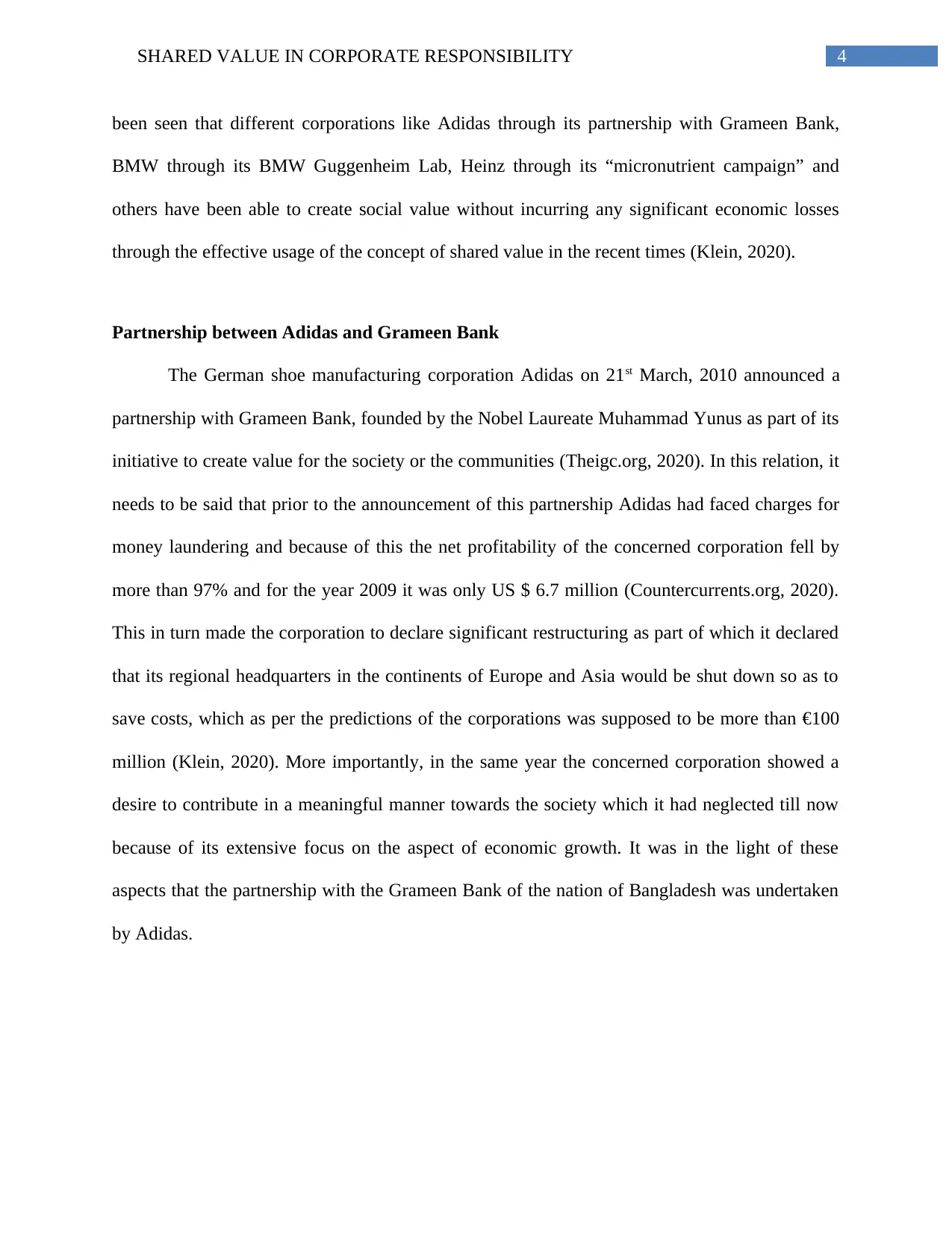
4SHARED VALUE IN CORPORATE RESPONSIBILITY
been seen that different corporations like Adidas through its partnership with Grameen Bank,
BMW through its BMW Guggenheim Lab, Heinz through its “micronutrient campaign” and
others have been able to create social value without incurring any significant economic losses
through the effective usage of the concept of shared value in the recent times (Klein, 2020).
Partnership between Adidas and Grameen Bank
The German shoe manufacturing corporation Adidas on 21st March, 2010 announced a
partnership with Grameen Bank, founded by the Nobel Laureate Muhammad Yunus as part of its
initiative to create value for the society or the communities (Theigc.org, 2020). In this relation, it
needs to be said that prior to the announcement of this partnership Adidas had faced charges for
money laundering and because of this the net profitability of the concerned corporation fell by
more than 97% and for the year 2009 it was only US $ 6.7 million (Countercurrents.org, 2020).
This in turn made the corporation to declare significant restructuring as part of which it declared
that its regional headquarters in the continents of Europe and Asia would be shut down so as to
save costs, which as per the predictions of the corporations was supposed to be more than €100
million (Klein, 2020). More importantly, in the same year the concerned corporation showed a
desire to contribute in a meaningful manner towards the society which it had neglected till now
because of its extensive focus on the aspect of economic growth. It was in the light of these
aspects that the partnership with the Grameen Bank of the nation of Bangladesh was undertaken
by Adidas.
been seen that different corporations like Adidas through its partnership with Grameen Bank,
BMW through its BMW Guggenheim Lab, Heinz through its “micronutrient campaign” and
others have been able to create social value without incurring any significant economic losses
through the effective usage of the concept of shared value in the recent times (Klein, 2020).
Partnership between Adidas and Grameen Bank
The German shoe manufacturing corporation Adidas on 21st March, 2010 announced a
partnership with Grameen Bank, founded by the Nobel Laureate Muhammad Yunus as part of its
initiative to create value for the society or the communities (Theigc.org, 2020). In this relation, it
needs to be said that prior to the announcement of this partnership Adidas had faced charges for
money laundering and because of this the net profitability of the concerned corporation fell by
more than 97% and for the year 2009 it was only US $ 6.7 million (Countercurrents.org, 2020).
This in turn made the corporation to declare significant restructuring as part of which it declared
that its regional headquarters in the continents of Europe and Asia would be shut down so as to
save costs, which as per the predictions of the corporations was supposed to be more than €100
million (Klein, 2020). More importantly, in the same year the concerned corporation showed a
desire to contribute in a meaningful manner towards the society which it had neglected till now
because of its extensive focus on the aspect of economic growth. It was in the light of these
aspects that the partnership with the Grameen Bank of the nation of Bangladesh was undertaken
by Adidas.
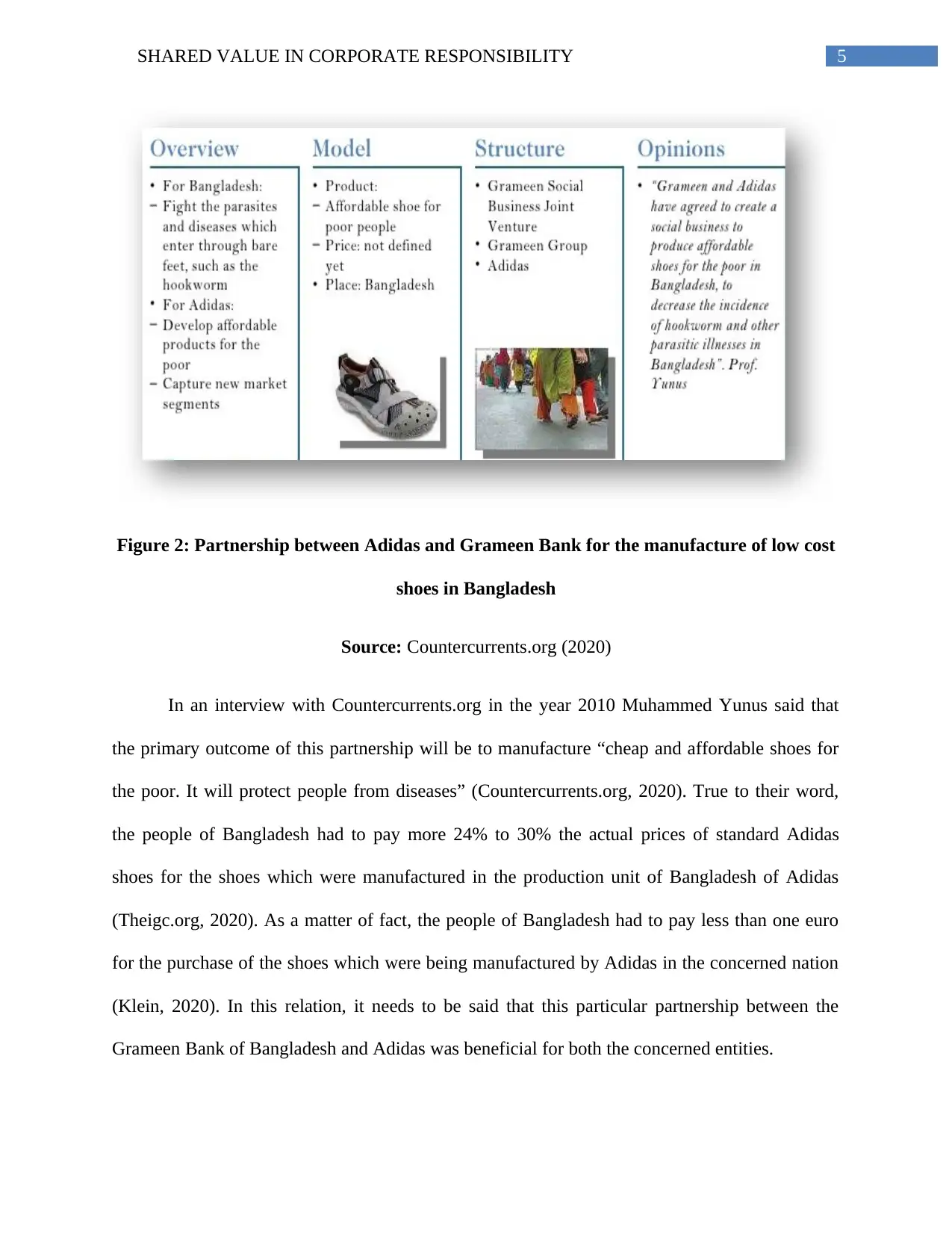
5SHARED VALUE IN CORPORATE RESPONSIBILITY
Figure 2: Partnership between Adidas and Grameen Bank for the manufacture of low cost
shoes in Bangladesh
Source: Countercurrents.org (2020)
In an interview with Countercurrents.org in the year 2010 Muhammed Yunus said that
the primary outcome of this partnership will be to manufacture “cheap and affordable shoes for
the poor. It will protect people from diseases” (Countercurrents.org, 2020). True to their word,
the people of Bangladesh had to pay more 24% to 30% the actual prices of standard Adidas
shoes for the shoes which were manufactured in the production unit of Bangladesh of Adidas
(Theigc.org, 2020). As a matter of fact, the people of Bangladesh had to pay less than one euro
for the purchase of the shoes which were being manufactured by Adidas in the concerned nation
(Klein, 2020). In this relation, it needs to be said that this particular partnership between the
Grameen Bank of Bangladesh and Adidas was beneficial for both the concerned entities.
Figure 2: Partnership between Adidas and Grameen Bank for the manufacture of low cost
shoes in Bangladesh
Source: Countercurrents.org (2020)
In an interview with Countercurrents.org in the year 2010 Muhammed Yunus said that
the primary outcome of this partnership will be to manufacture “cheap and affordable shoes for
the poor. It will protect people from diseases” (Countercurrents.org, 2020). True to their word,
the people of Bangladesh had to pay more 24% to 30% the actual prices of standard Adidas
shoes for the shoes which were manufactured in the production unit of Bangladesh of Adidas
(Theigc.org, 2020). As a matter of fact, the people of Bangladesh had to pay less than one euro
for the purchase of the shoes which were being manufactured by Adidas in the concerned nation
(Klein, 2020). In this relation, it needs to be said that this particular partnership between the
Grameen Bank of Bangladesh and Adidas was beneficial for both the concerned entities.
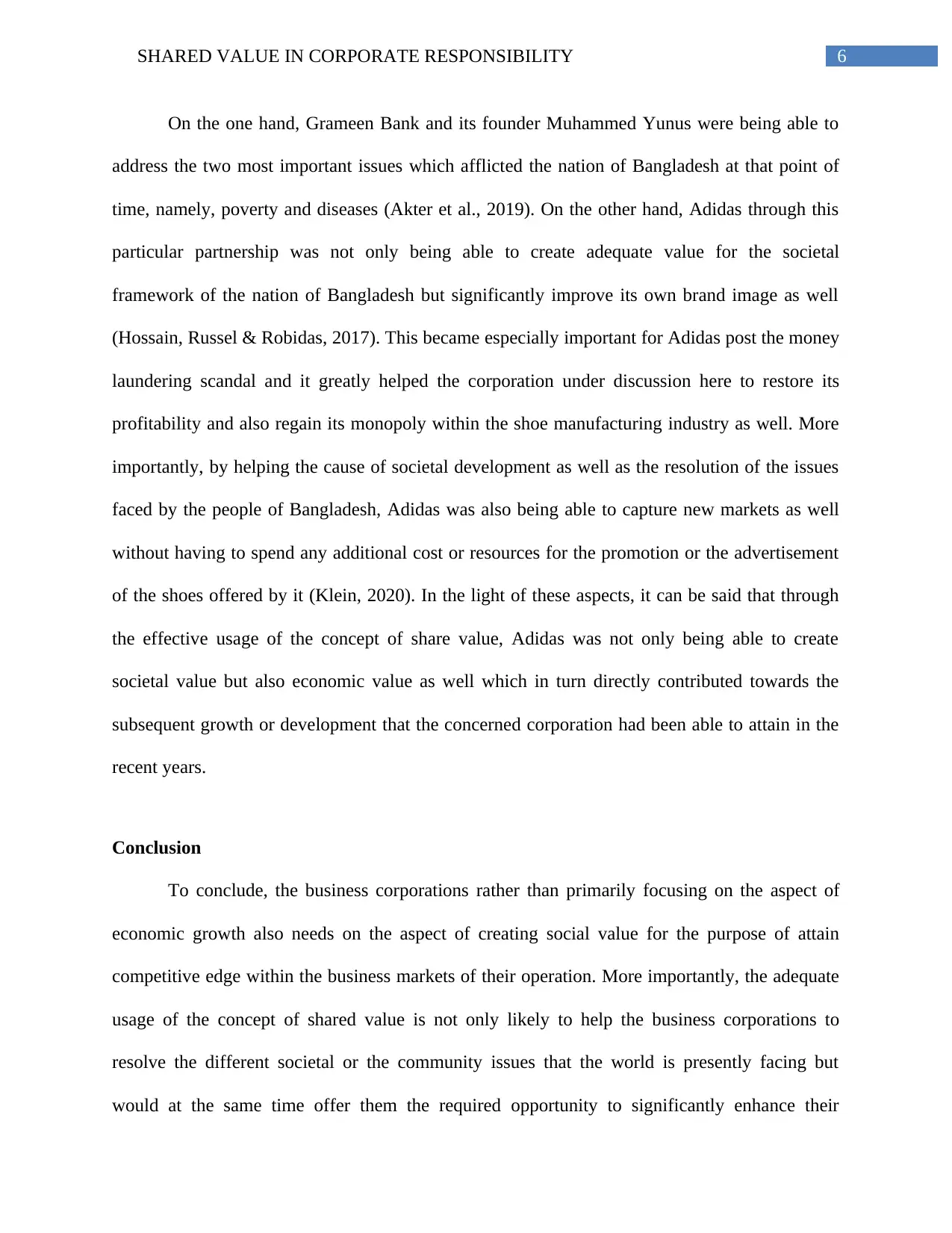
6SHARED VALUE IN CORPORATE RESPONSIBILITY
On the one hand, Grameen Bank and its founder Muhammed Yunus were being able to
address the two most important issues which afflicted the nation of Bangladesh at that point of
time, namely, poverty and diseases (Akter et al., 2019). On the other hand, Adidas through this
particular partnership was not only being able to create adequate value for the societal
framework of the nation of Bangladesh but significantly improve its own brand image as well
(Hossain, Russel & Robidas, 2017). This became especially important for Adidas post the money
laundering scandal and it greatly helped the corporation under discussion here to restore its
profitability and also regain its monopoly within the shoe manufacturing industry as well. More
importantly, by helping the cause of societal development as well as the resolution of the issues
faced by the people of Bangladesh, Adidas was also being able to capture new markets as well
without having to spend any additional cost or resources for the promotion or the advertisement
of the shoes offered by it (Klein, 2020). In the light of these aspects, it can be said that through
the effective usage of the concept of share value, Adidas was not only being able to create
societal value but also economic value as well which in turn directly contributed towards the
subsequent growth or development that the concerned corporation had been able to attain in the
recent years.
Conclusion
To conclude, the business corporations rather than primarily focusing on the aspect of
economic growth also needs on the aspect of creating social value for the purpose of attain
competitive edge within the business markets of their operation. More importantly, the adequate
usage of the concept of shared value is not only likely to help the business corporations to
resolve the different societal or the community issues that the world is presently facing but
would at the same time offer them the required opportunity to significantly enhance their
On the one hand, Grameen Bank and its founder Muhammed Yunus were being able to
address the two most important issues which afflicted the nation of Bangladesh at that point of
time, namely, poverty and diseases (Akter et al., 2019). On the other hand, Adidas through this
particular partnership was not only being able to create adequate value for the societal
framework of the nation of Bangladesh but significantly improve its own brand image as well
(Hossain, Russel & Robidas, 2017). This became especially important for Adidas post the money
laundering scandal and it greatly helped the corporation under discussion here to restore its
profitability and also regain its monopoly within the shoe manufacturing industry as well. More
importantly, by helping the cause of societal development as well as the resolution of the issues
faced by the people of Bangladesh, Adidas was also being able to capture new markets as well
without having to spend any additional cost or resources for the promotion or the advertisement
of the shoes offered by it (Klein, 2020). In the light of these aspects, it can be said that through
the effective usage of the concept of share value, Adidas was not only being able to create
societal value but also economic value as well which in turn directly contributed towards the
subsequent growth or development that the concerned corporation had been able to attain in the
recent years.
Conclusion
To conclude, the business corporations rather than primarily focusing on the aspect of
economic growth also needs on the aspect of creating social value for the purpose of attain
competitive edge within the business markets of their operation. More importantly, the adequate
usage of the concept of shared value is not only likely to help the business corporations to
resolve the different societal or the community issues that the world is presently facing but
would at the same time offer them the required opportunity to significantly enhance their
Paraphrase This Document
Need a fresh take? Get an instant paraphrase of this document with our AI Paraphraser
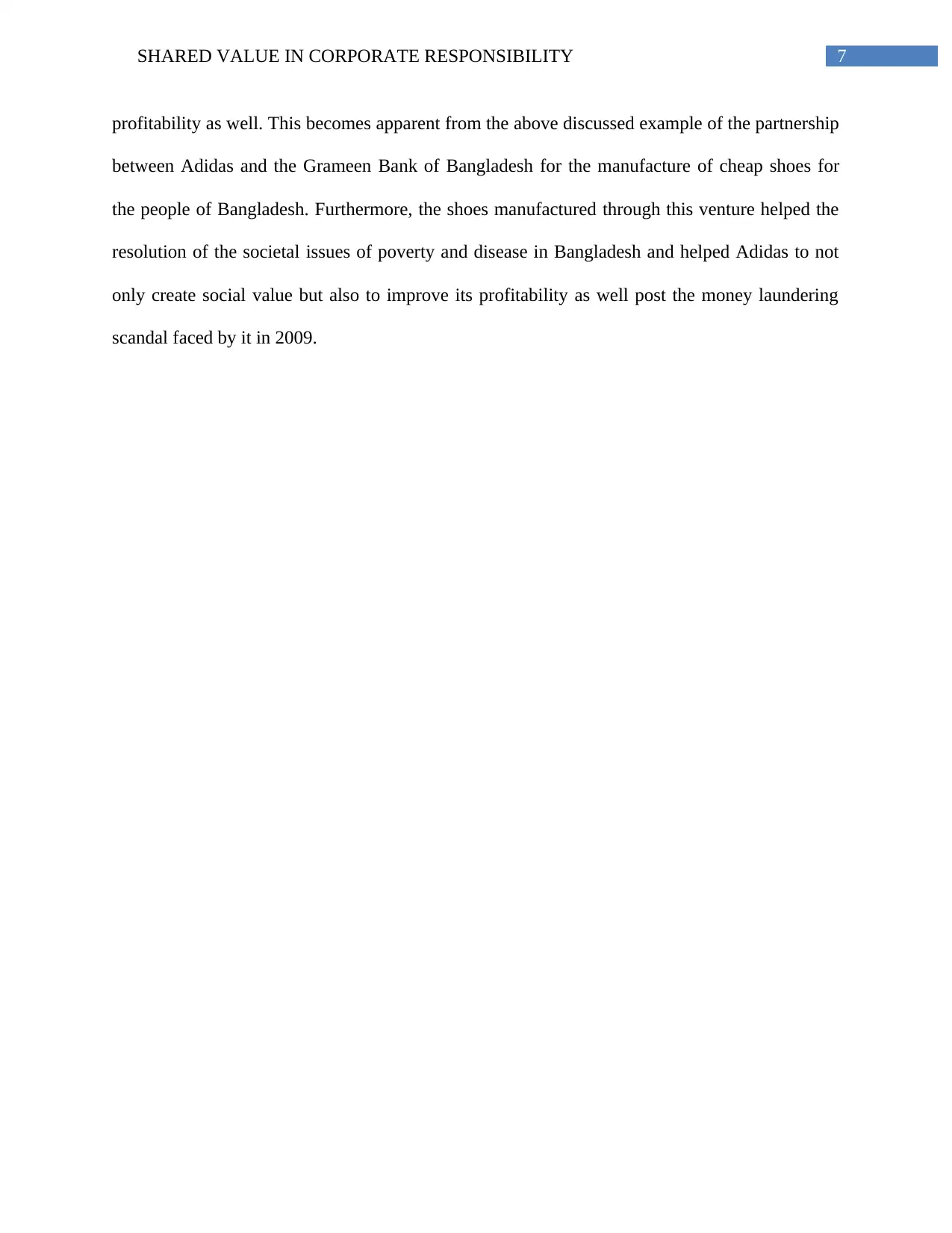
7SHARED VALUE IN CORPORATE RESPONSIBILITY
profitability as well. This becomes apparent from the above discussed example of the partnership
between Adidas and the Grameen Bank of Bangladesh for the manufacture of cheap shoes for
the people of Bangladesh. Furthermore, the shoes manufactured through this venture helped the
resolution of the societal issues of poverty and disease in Bangladesh and helped Adidas to not
only create social value but also to improve its profitability as well post the money laundering
scandal faced by it in 2009.
profitability as well. This becomes apparent from the above discussed example of the partnership
between Adidas and the Grameen Bank of Bangladesh for the manufacture of cheap shoes for
the people of Bangladesh. Furthermore, the shoes manufactured through this venture helped the
resolution of the societal issues of poverty and disease in Bangladesh and helped Adidas to not
only create social value but also to improve its profitability as well post the money laundering
scandal faced by it in 2009.
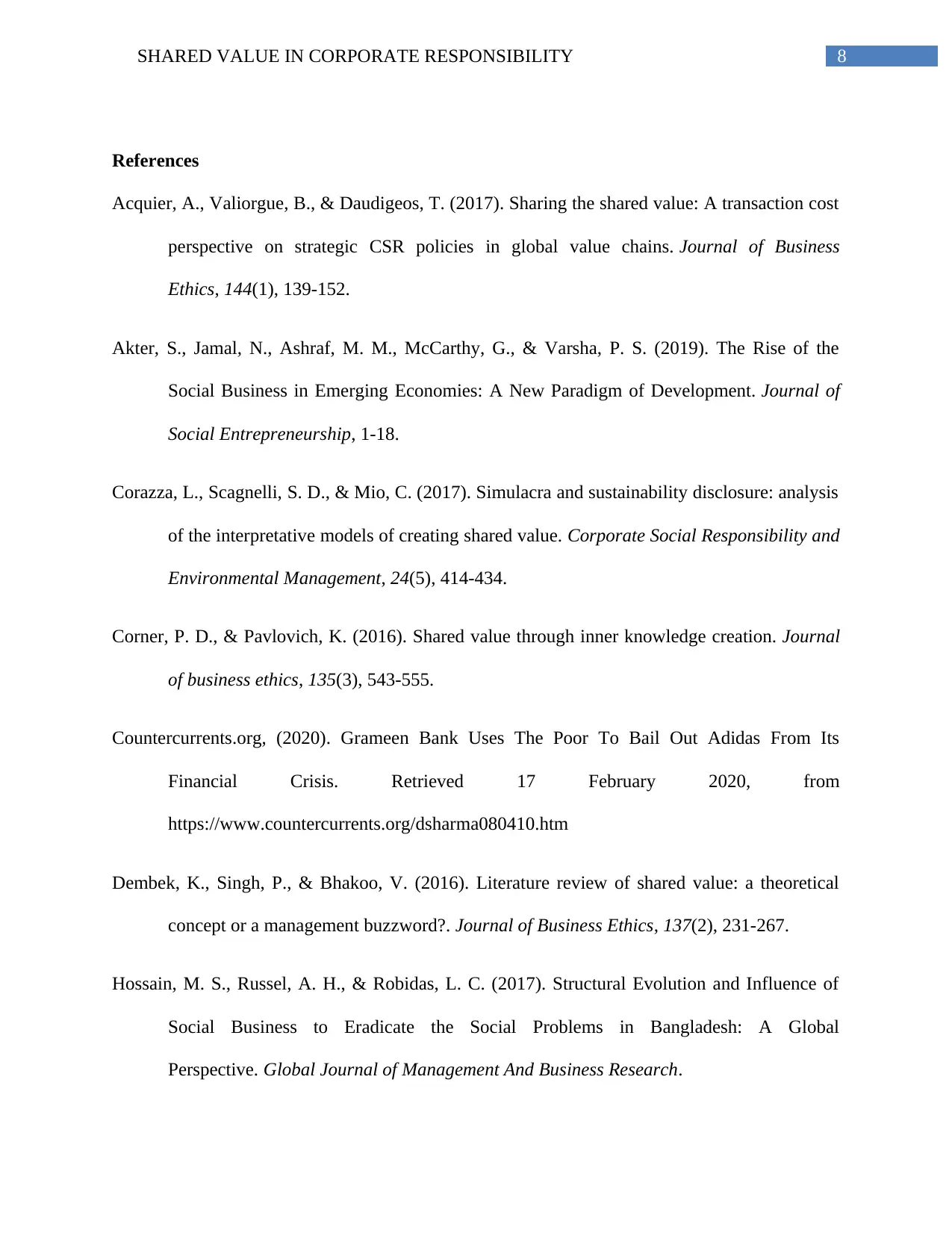
8SHARED VALUE IN CORPORATE RESPONSIBILITY
References
Acquier, A., Valiorgue, B., & Daudigeos, T. (2017). Sharing the shared value: A transaction cost
perspective on strategic CSR policies in global value chains. Journal of Business
Ethics, 144(1), 139-152.
Akter, S., Jamal, N., Ashraf, M. M., McCarthy, G., & Varsha, P. S. (2019). The Rise of the
Social Business in Emerging Economies: A New Paradigm of Development. Journal of
Social Entrepreneurship, 1-18.
Corazza, L., Scagnelli, S. D., & Mio, C. (2017). Simulacra and sustainability disclosure: analysis
of the interpretative models of creating shared value. Corporate Social Responsibility and
Environmental Management, 24(5), 414-434.
Corner, P. D., & Pavlovich, K. (2016). Shared value through inner knowledge creation. Journal
of business ethics, 135(3), 543-555.
Countercurrents.org, (2020). Grameen Bank Uses The Poor To Bail Out Adidas From Its
Financial Crisis. Retrieved 17 February 2020, from
https://www.countercurrents.org/dsharma080410.htm
Dembek, K., Singh, P., & Bhakoo, V. (2016). Literature review of shared value: a theoretical
concept or a management buzzword?. Journal of Business Ethics, 137(2), 231-267.
Hossain, M. S., Russel, A. H., & Robidas, L. C. (2017). Structural Evolution and Influence of
Social Business to Eradicate the Social Problems in Bangladesh: A Global
Perspective. Global Journal of Management And Business Research.
References
Acquier, A., Valiorgue, B., & Daudigeos, T. (2017). Sharing the shared value: A transaction cost
perspective on strategic CSR policies in global value chains. Journal of Business
Ethics, 144(1), 139-152.
Akter, S., Jamal, N., Ashraf, M. M., McCarthy, G., & Varsha, P. S. (2019). The Rise of the
Social Business in Emerging Economies: A New Paradigm of Development. Journal of
Social Entrepreneurship, 1-18.
Corazza, L., Scagnelli, S. D., & Mio, C. (2017). Simulacra and sustainability disclosure: analysis
of the interpretative models of creating shared value. Corporate Social Responsibility and
Environmental Management, 24(5), 414-434.
Corner, P. D., & Pavlovich, K. (2016). Shared value through inner knowledge creation. Journal
of business ethics, 135(3), 543-555.
Countercurrents.org, (2020). Grameen Bank Uses The Poor To Bail Out Adidas From Its
Financial Crisis. Retrieved 17 February 2020, from
https://www.countercurrents.org/dsharma080410.htm
Dembek, K., Singh, P., & Bhakoo, V. (2016). Literature review of shared value: a theoretical
concept or a management buzzword?. Journal of Business Ethics, 137(2), 231-267.
Hossain, M. S., Russel, A. H., & Robidas, L. C. (2017). Structural Evolution and Influence of
Social Business to Eradicate the Social Problems in Bangladesh: A Global
Perspective. Global Journal of Management And Business Research.
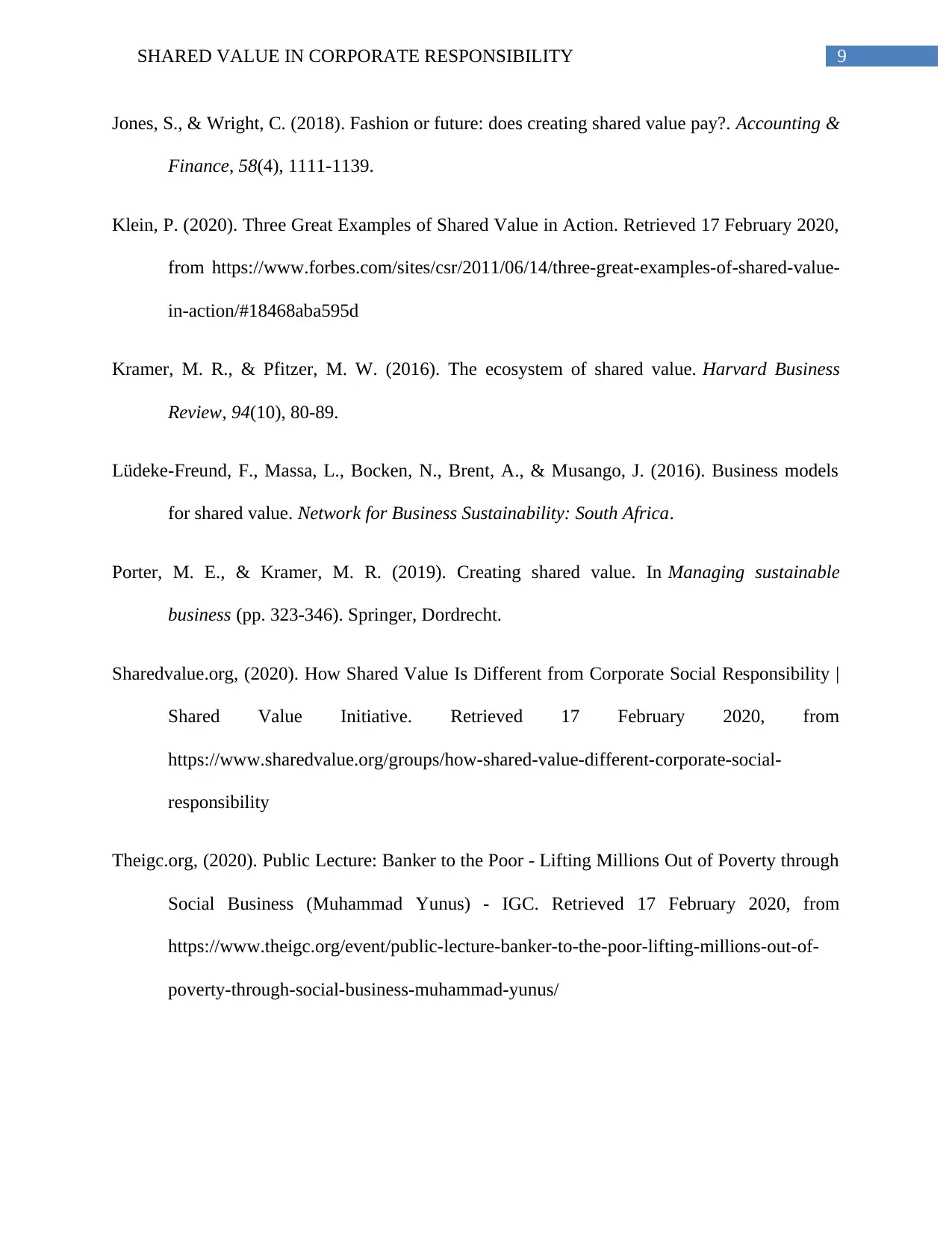
9SHARED VALUE IN CORPORATE RESPONSIBILITY
Jones, S., & Wright, C. (2018). Fashion or future: does creating shared value pay?. Accounting &
Finance, 58(4), 1111-1139.
Klein, P. (2020). Three Great Examples of Shared Value in Action. Retrieved 17 February 2020,
from https://www.forbes.com/sites/csr/2011/06/14/three-great-examples-of-shared-value-
in-action/#18468aba595d
Kramer, M. R., & Pfitzer, M. W. (2016). The ecosystem of shared value. Harvard Business
Review, 94(10), 80-89.
Lüdeke-Freund, F., Massa, L., Bocken, N., Brent, A., & Musango, J. (2016). Business models
for shared value. Network for Business Sustainability: South Africa.
Porter, M. E., & Kramer, M. R. (2019). Creating shared value. In Managing sustainable
business (pp. 323-346). Springer, Dordrecht.
Sharedvalue.org, (2020). How Shared Value Is Different from Corporate Social Responsibility |
Shared Value Initiative. Retrieved 17 February 2020, from
https://www.sharedvalue.org/groups/how-shared-value-different-corporate-social-
responsibility
Theigc.org, (2020). Public Lecture: Banker to the Poor - Lifting Millions Out of Poverty through
Social Business (Muhammad Yunus) - IGC. Retrieved 17 February 2020, from
https://www.theigc.org/event/public-lecture-banker-to-the-poor-lifting-millions-out-of-
poverty-through-social-business-muhammad-yunus/
Jones, S., & Wright, C. (2018). Fashion or future: does creating shared value pay?. Accounting &
Finance, 58(4), 1111-1139.
Klein, P. (2020). Three Great Examples of Shared Value in Action. Retrieved 17 February 2020,
from https://www.forbes.com/sites/csr/2011/06/14/three-great-examples-of-shared-value-
in-action/#18468aba595d
Kramer, M. R., & Pfitzer, M. W. (2016). The ecosystem of shared value. Harvard Business
Review, 94(10), 80-89.
Lüdeke-Freund, F., Massa, L., Bocken, N., Brent, A., & Musango, J. (2016). Business models
for shared value. Network for Business Sustainability: South Africa.
Porter, M. E., & Kramer, M. R. (2019). Creating shared value. In Managing sustainable
business (pp. 323-346). Springer, Dordrecht.
Sharedvalue.org, (2020). How Shared Value Is Different from Corporate Social Responsibility |
Shared Value Initiative. Retrieved 17 February 2020, from
https://www.sharedvalue.org/groups/how-shared-value-different-corporate-social-
responsibility
Theigc.org, (2020). Public Lecture: Banker to the Poor - Lifting Millions Out of Poverty through
Social Business (Muhammad Yunus) - IGC. Retrieved 17 February 2020, from
https://www.theigc.org/event/public-lecture-banker-to-the-poor-lifting-millions-out-of-
poverty-through-social-business-muhammad-yunus/
1 out of 10
Related Documents
Your All-in-One AI-Powered Toolkit for Academic Success.
+13062052269
info@desklib.com
Available 24*7 on WhatsApp / Email
![[object Object]](/_next/static/media/star-bottom.7253800d.svg)
Unlock your academic potential
© 2024 | Zucol Services PVT LTD | All rights reserved.




